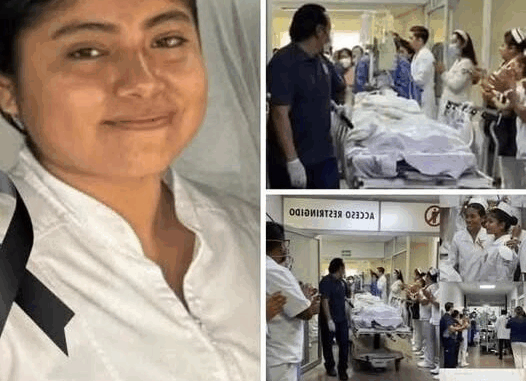

Rosaura García Moreno, a 20-year-old nursing student from Tuxtepec, Oaxaca, has become a symbol of compassion and selflessness after her final act saved and transformed the lives of many. Her story began with tragedy but ended with hope for others. Following a severe car accident that left her with catastrophic injuries, doctors determined she had suffered brain death. In that moment of profound grief, her parents were faced with an unimaginable choice. Instead of turning inward, they chose to honor their daughter’s lifelong dream of helping people by donating her organs to patients in need.
The donation process was handled by the High Specialty Medical Unit (UMAE) of the Mexican Social Security Institute (IMSS), located at the Adolfo Ruiz Cortines National Medical Center’s Specialty Hospital No. 14 in Veracruz. Highly trained surgical teams worked with precision and care to ensure that Rosaura’s gift could reach those who were waiting for a second chance at life. Her kidneys and corneas were transplanted into patients in Veracruz, while her liver was sent to the Siglo XXI UMAE in Mexico City for another critically ill recipient. Medical experts note that the decision of a single donor can directly save up to eight lives, and improve the quality of life for fifty or more through tissue donations such as corneas, skin, and bone.
Rosaura’s story resonates deeply because of who she was in life. As a nursing student at the Universidad del Papaloapan’s Tuxtepec campus, she had chosen a profession dedicated to healing and service. Friends and classmates remember her as someone who approached her studies with both ambition and kindness, always willing to help peers and patients during her training. She had a genuine warmth that made people feel seen and cared for, traits that are essential in a nurse and rare even among the most experienced professionals.
Her passing has struck an emotional chord not just in her hometown but also across the medical community. Organ donation remains a critical need in Mexico and around the world, with thousands of patients on waiting lists for life-saving transplants. By choosing to donate Rosaura’s organs, her family turned a moment of heartbreak into one of hope, embodying the very principles she aspired to uphold as a healthcare worker.
The IMSS and the transplant teams involved have publicly recognized Rosaura’s contribution, highlighting the ripple effect her gift will have for years to come. Patients who were once facing the prospect of death now have renewed chances at life, and individuals who had lost their sight will once again be able to see the world—because of her. These are not just medical victories; they are deeply personal stories of recovery, family reunions, and futures that are now possible.
Rosaura’s legacy also serves as a call to action. In many places, myths, fears, and lack of awareness prevent people from becoming organ donors. Her example reminds us that organ donation is not simply a medical decision, but an act of profound human solidarity. It is a way to ensure that even in the face of loss, life continues.
For her family, the knowledge that Rosaura lives on through the people she helped offers comfort amid sorrow. They know that her heart, her compassion, and her dreams are now carried forward by others. Friends say that even in her absence, she remains a guiding light—proof that the spirit of care and kindness can outlast a lifetime.
Rosaura García Moreno may have left this world far too soon, but her impact will endure. She will be remembered not only as a promising young nurse but as a hero whose final gift brought healing, vision, and life to so many. Her story is one of love, generosity, and the power of one individual to change countless destinies.
Để lại một phản hồi